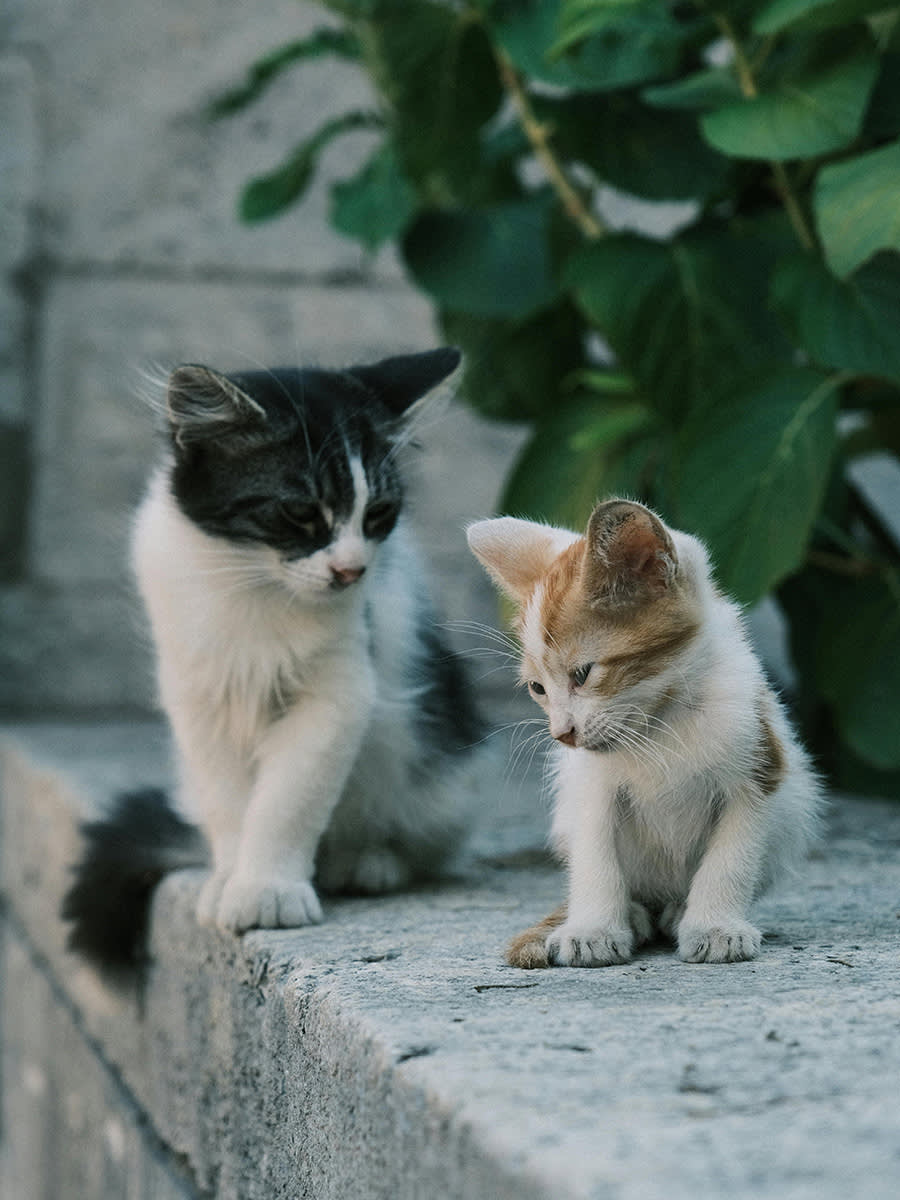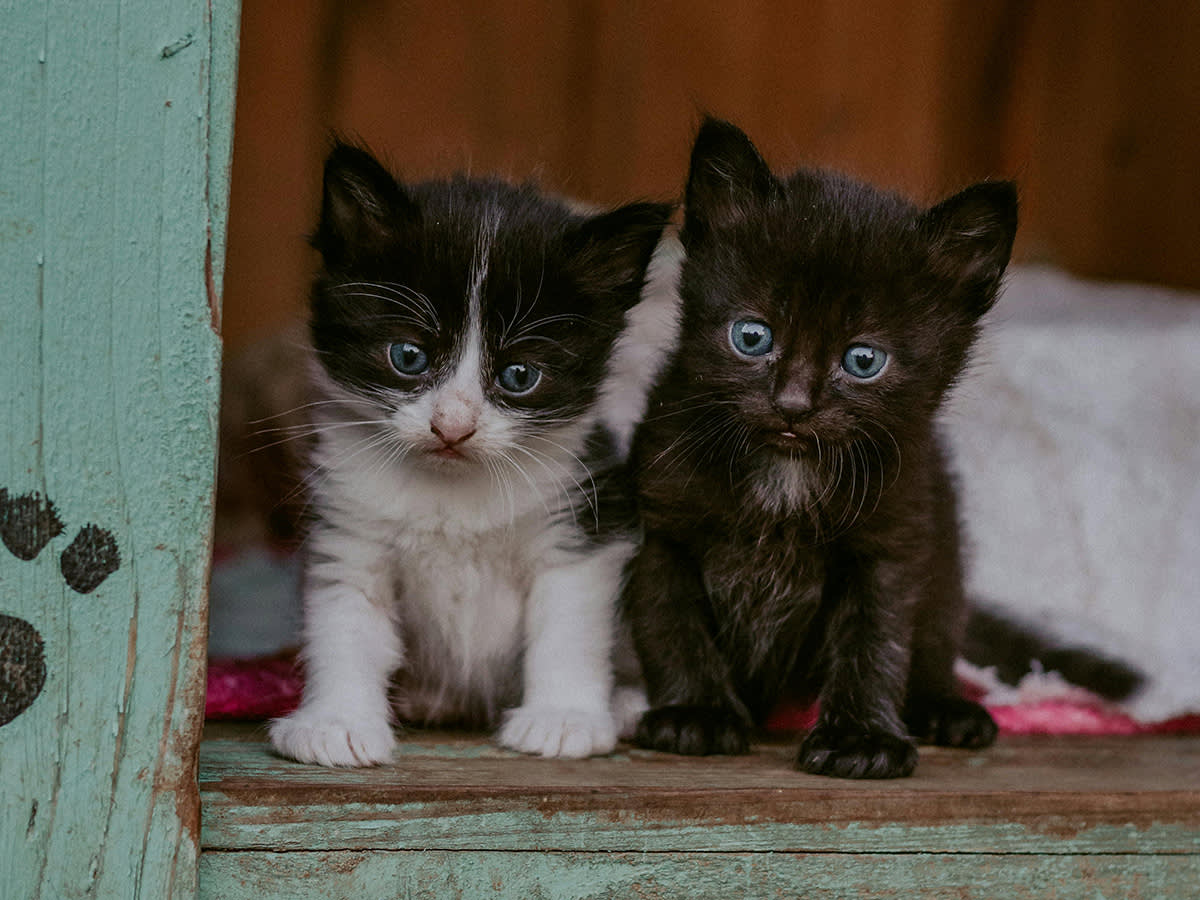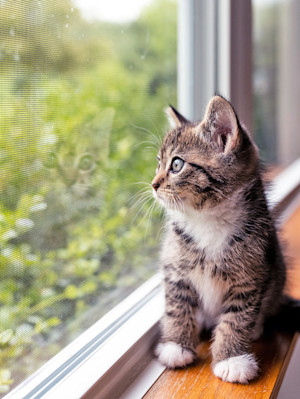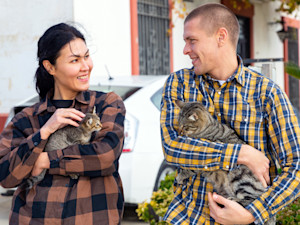How to Raise a Confident Cat: the Secret to Socialising Your Kitten Early
Calling all new kitten parents...
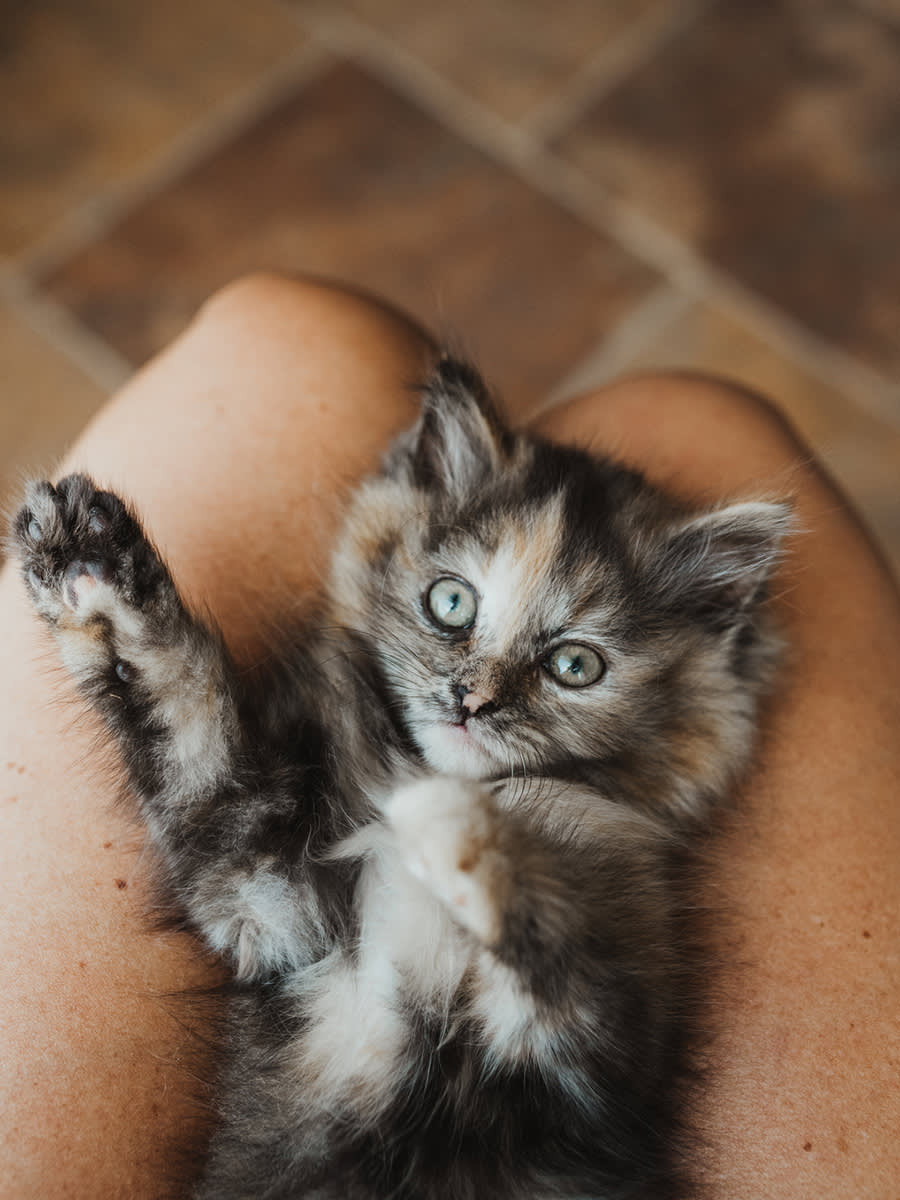
Share Article
Welcoming a kitten into your life is equal parts chaos and cuddles – and as a responsible pet parent it’s your job to turn that skittish, wall-climbing kitten into a well-adjusted confident cat. Without positive experiences in those early weeks, kittens can become anxious or develop behaviours such as fear of people, strange noises and vet visits, which are much harder to undo further down the line than they are to teach from an early age
So how best to socialise a kitten and desensitise them to the world? Read on to find out how to give your kitten the best possible start in life.
What is kitten socialisation?
Kitten socialisation is all about helping your bundle of cuteness adjust to the world – with its sounds, smells, people and general hustle and bustle – so they grow into a confident adult cat. It takes place in those precious early weeks when kittens‘ brains are like sponges. With the right experiences, they learn what’s normal and safe, laying the groundwork for a lifetime of calm curiosity.
Why do I need to socialise my kitten?
Put simply: socialisation isn’t a luxury – it’s the foundation of a happier, more adaptable cat. According to animal behaviourist Lottie Phillips, adequate kitten socialisation offers big benefits. “A kitten accustomed to common household noises and gentle handling is much less likely to be fearful and anxious when they’re older,” she explains. “Cats are naturally skittish animals because they are solitary and don’t usually rely on packs to protect them, so you need to be their safe place,” Lottie says.
Socialised kittens also typically make more affectionate, well-adjusted pets, less prone to hiding, aggression or anxiety. Early exposure to handling, carriers and background noise means vet visits and travel are less stressful too for both cat and pet parent.
What can happen if I don’t socialise my kitten?
“If a kitten isn’t socialised properly during their early weeks, they can grow up fearful, anxious or even aggressive in unfamiliar situations. You might find your adult cat hiding under the bed when friends come over, hissing at other pets or being impossible to get into a carrier for a vet visit,” explains Lottie.
Unsocialised cats often struggle with stress, making routine tasks like nail trimming or going to the cattery a nightmare – for both of you. “More seriously, a lack of socialisation can increase the risk of behavioural issues that are hard to correct later, potentially impacting your cat’s quality of life and the bond you share.”
In practical terms, this means a cat who won’t let you cuddle them, hides at the sound of a vacuum cleaner, or reacts badly to children and other animals. While some aloofness is normal (this is a cat we’re talking about), chronic anxiety or reactivity usually stems from missed early experiences.
What is the socialisation period?
The socialisation period is a short but critical window in a kitten’s development – “roughly between 2–7 weeks of age, though some experts extend this up to 14 weeks,” says Lottie. During this time, kittens are like little sponges: they’re naturally curious and more open to new experiences. It’s when they learn what’s safe and what’s scary, who their friends are (human and otherwise), and how to interact with the world around them.
What kittens experience – or don’t experience – during this period can stick with them for life. “A kitten that’s exposed to lots of people, noises, smells and gentle handling will be much more adaptable as an adult. If you adopt a kitten at around 8–12 weeks old, you’re catching the tail end of this window, which is still a brilliant time to help them learn the ropes.”
How to tell if your kitten has been socialised
It’s recommended not to adopt a kitten or separate them from their mother until they are between 8–12 weeks old, so some of the socialisation might have already happened in the home you adopted them from. Or if you’re adopting an older kitten you’ll want to know how to determine the level of socialisation they’ve already experienced.
“A well-socialised kitten tends to be confident, curious and adaptable,” says Lottie. They’re happy to approach new people, explore new environments and recover quickly from surprises. “They’ll allow you to touch their paws, ears and mouth without freaking out, and they’re more likely to enjoy playtime with both humans and other animals.”
You’ll also notice they’re more relaxed during routine activities, like being groomed or visiting the vet. They might still get nervous – kittens are babies, after all – but a socialised kitten will usually bounce back quickly.
“Watch how they react to new experiences,” suggests Lottie. “Do they hide and hiss, or do they cautiously investigate and then relax? It’s not about having a super-bold kitten, but about helping them feel safe and supported as they learn the ropes of the big wide world.”
How to socialise your kitten
Whatever age you adopt your kitten, you’ll want to continue their socialisation. Start simple: human contact. “Make time every day to gently handle your kitten – stroke them, pick them up briefly, touch their paws and ears, and talk to them in a calm voice,” says Lottie. Encourage other people (within your household or safe visitors) to interact with them too. The aim is to get your kitten comfortable with a variety of humans, not just you.
“Introduce them to common household experiences in a slow and controlled way. Let them explore different rooms, meet any other pets gradually, and encounter household noises (like the washing machine or TV). Use toys to build positive associations and let them retreat when they’ve had enough. Socialisation should be a series of tiny, positive exposures – not one big overwhelming blast.”
Lottie recommends using treats and play to reinforce good experiences. For example, let them sniff a new object or meet a friend, then offer a lick of kitten-safe treat paste. Keep interactions short and sweet, and always respect your kitten’s boundaries. A well-socialised kitten is one who feels safe enough to be curious, not one who’s forced into situations.
How to desensitise kittens to smells and sounds
Kittens have powerful senses, and unfamiliar smells or sudden noises can be genuinely scary to them. Desensitisation means introducing these stimuli gradually and in a non-threatening way, so your kitten learns they’re nothing to worry about.
“For sounds, start with recordings of everyday noises – doorbells, vacuum cleaners, traffic, even fireworks – and play them at a low volume while your kitten is relaxed or playing. Gradually increase the volume over days or weeks. The goal is for your kitten to learn that these sounds don’t mean danger,” says Lottie.
“When it comes to smells, gently introduce your kitten to new scents using safe household items – rub a cloth on another pet or item, and let your kitten sniff it while you offer a treat or cuddles. If you’re planning to take your kitten to different homes or have guests often, this kind of exposure can help them adapt more easily.”
Always pair new sounds or smells with something positive, recommends Lottie, such as food, toys or affection to help your kitten associate them with good things. Think of it like building a little mental archive of “safe” experiences.
Can feral kittens be socialised?
If you’ve adopted a kitten who hasn’t come from a breeder or rescue centre and has instead been born on the streets – in other words, a feral kitten – socialising them can be a bit harder.
“Feral kittens can be socialised, but it takes time, patience and consistency,” says Lottie. The younger they are, the better. “Ideally, you’ll want to start before they reach 8 weeks old. Beyond that, it becomes more challenging, but not impossible. The key is to go at their pace and build trust slowly.”
Lottie explains that you should start by letting them observe you from a safe space. Sit near them and talk softly without trying to touch them. Over time, offer food while you’re nearby, and gradually reduce the distance. Eventually, you can start introducing gentle play and handling, always letting them lead.
“Be prepared for setbacks and don’t take it personally if progress is slow. Some feral kittens become affectionate lap cats, while others may always be a bit cautious. The most important thing is to provide a stable, loving environment where they feel safe,” says Lottie.
If you’re socialising a feral kitten, working with a vet or rescue centre can be a big help. They’ll have experience and advice tailored to your kitten’s background – and it’s always better to get guidance early than to try and fix a problem later.
The bottom line: how to socialise a kitten
Socialising your kitten might feel like just another thing on the new pet to-do list, but it’s genuinely one of the most important things you can do to set them up for a happy, low-stress life. Those early weeks are a golden opportunity to help your kitten feel safe, curious and confident in the world around them – from new people and pets to unfamiliar noises and smells.
Whether your kitten is from a breeder, rescue or was born outside, positive exposure and gentle handling can make all the difference. Put in the time now, and you’ll be rewarded with a chilled-out companion who thrives in the chaos of real life – and maybe even enjoys the odd cuddle on your terms.
Frequently asked questions
When should I start socialising my kitten?
Start socialisation as soon as you bring your kitten into your life. Ideally, some socialisation should also have been done beforehand by the breeder or rescue centre.
Is it OK to socialise my kitten with dogs or other pets?
Yes, as long as the other animals are calm and well-behaved, and introductions are slow, supervised and positive –never force interactions.
Can I over-socialise my kitten or overwhelm them?
If you push too much too fast, your kitten might become fearful. Keep new experiences short, positive and let your kitten retreat when they need to.
My kitten hides a lot – is that normal during socialisation?
Yes, especially at first. Hiding is a natural coping mechanism, so give them time and space while continuing to offer gentle encouragement and rewards for brave behaviour.
How long does it take to socialise a kitten?
It varies depending on the kitten’s personality and background, but with daily gentle handling and exposure, most kittens show progress within a few weeks.
Ro Elfberg
Ro is Kinship UK’s Senior Editor. She has previously written and copy-edited for British Vogue, Glamour and DICE. When she’s not being manipulated into dishing out Dreamies to Kobe the cat, she spends her free time trying to convince her snake, Butters, to wear a tiny hat.
Related articles
![]()
When Can My Kitten Go Outside in the UK?
If you’d like your kitten to grow up with outdoor access, here’s what to know to help keep them safe
![Kitten in a dustbin]()
5 Ways to Cope If Your Kitten Is Driving You Nuts
Overwhelmed by BKE? (Big Kitten Energy to you and me...)
What Can I Feed a Kitten?
Learn what nutrients are a must for your new little one
![Kittens and the Litter Robot kitty litter box.]()
The Best Litter Boxes for Kittens in 2024
Help your little one learn the ropes
![woman holding tabby kitten smiles at man holding tabby cat]()
How to Introduce Your Adult Cat to a New Kitten
Whether you have a friendly feline or a senior sourpuss, it’s important to help your cat adjust to a new kitten in the house

